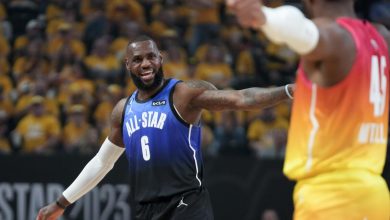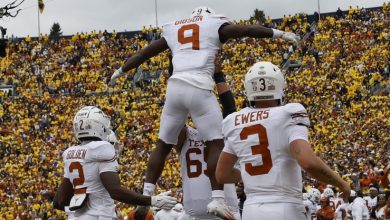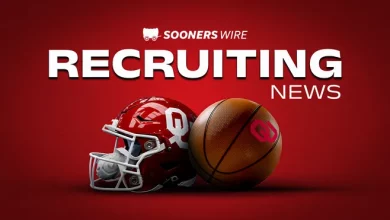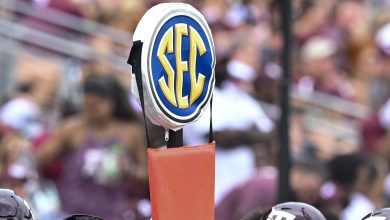Iamaleava quickly committed to UCLA after leaving Tennessee, signaling a fresh start and big expectations for the talented young quarterback.
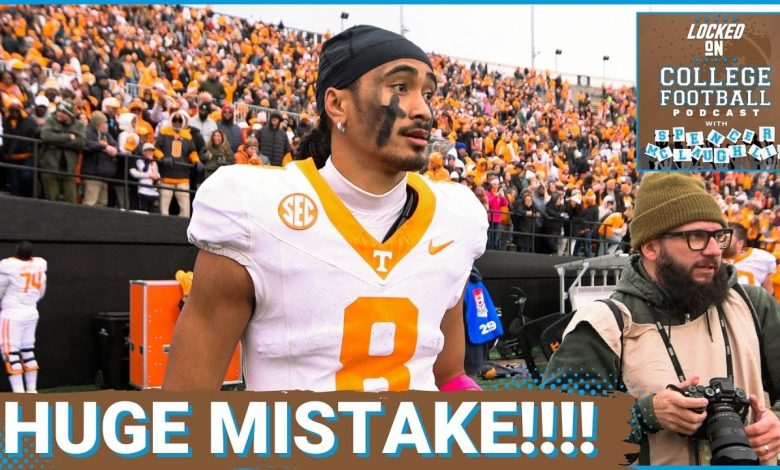
In a stunning yet increasingly common twist in the modern college football landscape, quarterback Nico Iamaleava has transferred from the University of Tennessee to UCLA, quickly committing to the Bruins in what appears to be a calculated reset and a fresh opportunity. The former five-star recruit, once hailed as the future of Tennessee football, is now poised to take the reins of a program navigating its own identity under new leadership and evolving expectations. The move, while surprising on the surface, reflects deeper currents in college football—about fit, opportunity, and the need for young stars to find the right platform.
From Knoxville to Westwood: A Surprising Departure
Iamaleava’s decision to leave Tennessee raised eyebrows across the college football community. After all, he was widely regarded as one of the most talented quarterbacks in the 2023 recruiting class. Standing 6-foot-6 and weighing around 200 pounds, Iamaleava possessed all the physical tools—arm strength, athleticism, poise, and football IQ—to become a program cornerstone. His recruitment was a national saga, and his commitment to Tennessee was seen as a major victory for head coach Josh Heupel.
But the promise of the future and the reality of the present don’t always align. Despite flashes of brilliance, Iamaleava’s time in Knoxville never fully materialized into a breakout. Whether due to scheme fit, competition, injury concerns, or simply an underwhelming connection with the coaching staff, the writing seemed to be on the wall by the end of his first full season. As the portal opened, he made the jump—and in remarkably short order, chose UCLA.
It was a bold move, one that signaled not only his desire for a fresh start, but also a confidence in what UCLA offers.
Why UCLA?
UCLA’s allure goes beyond sunshine and palm trees, though those certainly don’t hurt. The Bruins have long sought a dynamic quarterback to lift them into the upper echelon of the college football world. With Chip Kelly now gone and a new era beginning under a fresh coaching regime, the program is in flux—but also ripe for reinvention.
For Iamaleava, the move to UCLA offers several advantages:
1. Proximity to Home: A California native, Iamaleava played his high school ball at Warren High School in Downey. Returning to the West Coast allows him to be closer to family, which can be crucial for young athletes navigating the pressures of elite college football.
2. Style of Play: The new-look UCLA offense is expected to favor a balanced, quarterback-friendly scheme. It’s a system that could showcase Iamaleava’s mobility and vertical passing ability, unlike Tennessee’s more rigid playbook that may not have allowed his full skill set to flourish.
3. Immediate Opportunity: UCLA’s quarterback room is far from settled. With a roster in transition, Iamaleava will likely have every opportunity to compete for the starting job from day one. There are few better situations for a talented young signal-caller who’s looking to make an impact quickly.
The Landscape of the Modern Transfer Portal
Iamaleava’s quick pivot to UCLA reflects a larger trend in college football: the normalization—and even expectation—of movement through the transfer portal. Once stigmatized, transferring is now a strategic decision, and players are increasingly empowered to find better fits when their initial choices don’t pan out.
In many ways, Iamaleava’s journey mirrors that of high-profile quarterbacks like Caleb Williams, Bo Nix, or Michael Penix Jr., all of whom transferred and found renewed success at their new homes. Each quarterback redefined their trajectory by finding the right system, support staff, and campus culture. The success of these players reinforces the idea that sometimes, the second stop is where the real story begins.
High Expectations—and the Pressure That Comes With Them
With immense talent comes immense pressure. Iamaleava is not just any quarterback; he was a generational recruit, widely ranked as the No. 1 or No. 2 QB in his class depending on the outlet. His NIL valuation soared into seven figures before he even played a college snap. Such early hype is both a blessing and a burden.
At UCLA, Iamaleava will face sky-high expectations. The Bruins fanbase has been hungry for a quarterback savior ever since the days of Brett Hundley and Josh Rosen. He’ll be seen as a program-changing figure—an immediate face of the new era, a West Coast prodigy returning home to lead a storied (if lately underperforming) program back to prominence.
That pressure is intensified by the national spotlight on the Pac-12’s evolution (or reformation), and the growing competitiveness of schools in the region. UCLA’s move to the Big Ten only adds complexity, as the level of week-in, week-out competition rises. Iamaleava will need to prove that he can handle not just the speed and physicality of top-tier defenses, but also the weight of expectation that comes with being “the guy.”
The Tools Are There
What makes the Iamaleava-to-UCLA storyline so compelling is that all the physical tools are still intact. He has a rocket arm, fluid footwork, and uncanny escapability for someone of his size. He’s known for his ability to make off-platform throws, read defenses quickly, and extend plays when the pocket collapses. When locked in, he can be a nightmare for opposing defenses.
Moreover, those who have watched him closely say his leadership and maturity are beginning to catch up with his raw talent. That combination—of physical prowess and emotional readiness—can be lethal, especially in a quarterback-centric league.
With a supportive environment and the right coaching, Iamaleava could become the star many projected him to be. And if he can lead UCLA to a resurgence in the Big Ten, he won’t just be a West Coast legend—he’ll be on every NFL scout’s radar.
A Turning Point for UCLA Football
Iamaleava’s arrival is not just a win for the Bruins on the field; it’s a major statement in recruiting and program-building. It signals that UCLA is a destination once again—not just for regional talent, but for national stars looking to reboot or rebrand.
Landing a player of Iamaleava’s caliber sends a ripple across the recruiting landscape. It suggests that UCLA is willing to compete in the NIL era, willing to make bold moves, and capable of attracting the kind of elite players who can change the direction of a program.
The synergy between Iamaleava’s personal journey and UCLA’s institutional ambitions could be the start of something transformative. For years, the Bruins have hovered in the middle of the pack, always talented, always intriguing, but rarely able to break through. With Iamaleava under center, that ceiling could rise dramatically.
What Comes Next?
The road ahead won’t be easy. Transitioning to a new team, learning a new playbook, building chemistry with receivers—it all takes time. And while fans may expect instant success, the reality is that even the best quarterbacks need space to adjust.
But there’s reason for optimism. Iamaleava has a natural charisma and confidence that galvanizes teammates. He’s used to the spotlight and seems unfazed by the noise. If he can translate that mental toughness into consistent play, the Bruins may finally have the quarterback they’ve long searched for.
It will also be interesting to see how the coaching staff builds around him. Will they cater the offense to his strengths? Can they protect him with a reliable offensive line? Will UCLA add transfer talent to surround him with a top-tier supporting cast?
These are the questions that will define not just Iamaleava’s UCLA chapter, but potentially the trajectory of the program itself.
Final Thoughts: A New Chapter with Old Expectations
Nico Iamaleava’s journey is still being written, but the latest chapter—his move to UCLA—has all the ingredients of a breakout. It’s a return home, a fresh system, a clean slate, and a renewed purpose. For a player once dubbed the future of Tennessee football, that future may now belong to Westwood.
And in this ever-evolving era of college football, perhaps it’s fitting. Because more than ever, success isn’t just about talent—it’s about fit, timing, and vision. Nico Iamaleava may have found all three at UCLA. Now comes the hard part: delivering on the promise that’s followed him every step of the way.



